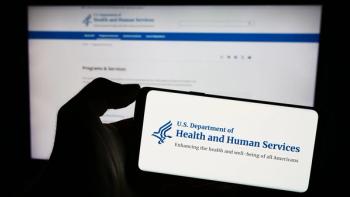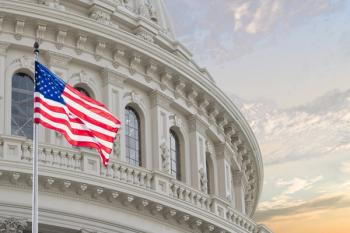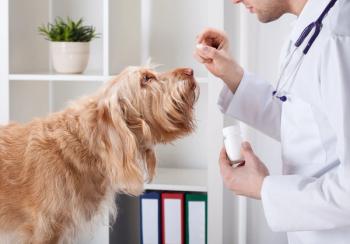
DVMs size up presidential candidates
Neither candidate has said much animals on the campaigns trail, but DVMs are watching the race closely.
WASHINGTON — While neither John McCain nor Barack Obama have had much to say about animals during their campaigns, other than to comment on porcines wearing cosmetics, the American Veterinary Medical Association (AVMA) and other veterinary groups are watching the presidential race closely.
The AVMA's chief executive last month challenged the candidates to integrate into their platforms positions in support of veterinary medicine, food safety and animal health and well-being.
"Animal and human health are nonpartisan issues, and we call on Senators McCain and Obama to honor America's citizens by supporting measures to protect them from zoonotic diseases, food-safety issues and animal-related bioterrorism," says Dr. W. Ron DeHaven, chief executive officer of the AVMA.
Perhaps no one is more aware of the impact government plays on animal-human health than Dr. Mark Lutschaunig, director of the AVMA Governmental Relations Division.
Issues AVMA considers critical
As the 110th Congress came to an end in September, Lutschaunig anticipated several issues important to veterinarians would languish and have to be reintroduced again next year.
The Veterinary Public Health Workforce Expansion Act (VPHWEA) is one. Although some groundwork was laid with the Higher Education Reauthorization Act (HERA), veterinarians say it still is not enough.
Other issues that will be brought back before Congress next year will be funding for the Food Animal Residue Avoidance Databank (FARAD) and the National Veterinary Medical Services Act (NVMSA).
Getting pet insurance placed under Section 125 of the Internal Revenue Service (IRS) code will be on the agenda, too.
And the Prevention of Equine Cruelty Act, which would criminalize certain actions having to do with horse slaughter, likely will make a reappearance.
Altogether, there are 50 issues pertaining to the profession on Congress' agenda.
AVMA wants the next president to realize the importance of these bills and the importance of veterinarians' roles in human and animal health.
"America's veterinarians are the first line of protectors of the health of our nation's animals," DeHaven says. "Unfortunately, our nation is heading toward a crisis because there are only 85,000 veterinarians to keep all of these animals and the humans in contact with them healthy."
Lutschaunig says having the new administration on board as the profession addresses the work-force shortage would be a major coup.
"Even if we get the bill passed, the President has to sign it. When asking for a significant amount of funding, it really has to come out of the President's budget. If that's the case, the administration has to recognize the problem, so we will work very hard to educate the new administration about the issues."
Getting FARAD and NVMSA in the presidential budget would make it easier to get those programs funded.
Lutschaunig's office already has relationships with McCain's and Obama's camps through their Congressional work. But he hopes to build on those relationships.
"We hope the new administration recognizes veterinarians' importance in public health and appoints veterinarians to positions of leadership within key departments," Lutschaunig says. "We also hope the administration looks to the AVMA when drafting bills on human health, public health and animal health and welfare."
Overall, both senators have been supportive of veterinary issues. In fact, Obama is a co-sponsor on the VPHWEA. McCain currently sponsors no veterinary legislation, according to Lutschaunig.
Given their nonprofit status, veterinary groups cannot endorse one candidate over another, but they do pay attention to the candidates' platforms.
For the American Association of Swine Veterinarians (AASV), the No. 1 issue is disease prevention, and their No. 1 concern is pig health, says Executive Director Dr. Thomas Burkgren.
"Lack of funding for animal health research is a big concern for our profession," Burkgren says. "For our portion of the profession, there is a woeful lack of funding for research."
That's especially problematic when issues such as banning the use of non-therapeutic antimicrobials rears its head.
Another issue for AASV and the American Association of Bovine Practitioners (AABP) is ethanol's impact on the cost of feed.
Dr. Gatz Ridell, executive vice-president of AABP, says his organization wants a candidate who will re-evaluate ethanol production and someone who recognizes the need for technology in food-animal production and is willing to support the agencies directed to make decisions on growth hormones and other drugs.
"Our population is growing," Ridell says. "The world population is growing. We're not going to be able to continue farming the way my grandfather farmed and have enough to feed our population."
But so far neither candidate has really addressed the needs of the agricultural population, Ridell says.
"The rural population is not high on the radar screen for people who want to get votes," he says. "Agriculture is such a minority, making up less than three-quarters of 1 percent of the population, that even though they are a major source of income for our economy and our gross national product, they don't get a lot of attention on the national level."
Keith Kleine, director of industry relations for the American Association of Equine Practitioners (AAEP), says equine issues are similar to those of other veterinarians.
One issue that is specific to AAEP is the horse-slaughter bill. Kline says both candidates have supported similar legislation in the past, but "things can change. Thoughts can change."
For the Association for Women Veterinarians (AWV), issues of work/life balance, equal pay and appropriate communication skills in the workplace are not profession-specific.
And while there has been some talk during this year's campaign about equal pay for women, Dr. Stacy Pritt, chair for the AWV board of directors, says solutions to those problems will likely come from within the profession.
"Strengthening the middle class and providing more regulations on lending practices will bolster the economy and provide a healthier income base for veterinary practitioners," she adds. "Candidates who can deliver on strengthening the economy will serve all veterinarians well."
Newsletter
From exam room tips to practice management insights, get trusted veterinary news delivered straight to your inbox—subscribe to dvm360.




